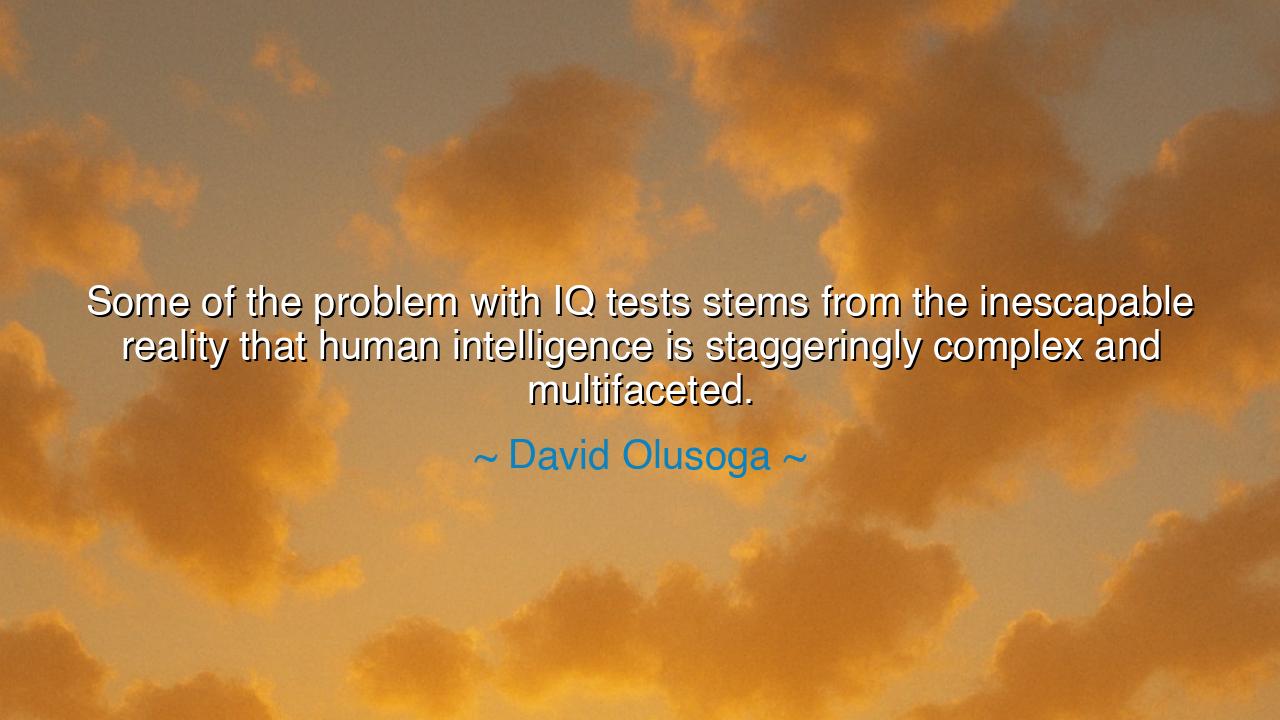
Some of the problem with IQ tests stems from the inescapable
Some of the problem with IQ tests stems from the inescapable reality that human intelligence is staggeringly complex and multifaceted.






“Some of the problem with IQ tests stems from the inescapable reality that human intelligence is staggeringly complex and multifaceted.” — David Olusoga
In these thoughtful and profound words, David Olusoga, the historian and storyteller of nations, reminds us of a truth both ancient and eternal — that human intelligence cannot be contained, measured, or defined by the narrow instruments of man. His voice, calm yet piercing, calls us to humility. He speaks of the complexity of the mind — that sacred fire which gives birth to art, science, compassion, and faith — and warns against the arrogance of those who would weigh the soul of a person upon the scale of a number. For intelligence, he tells us, is not a single stream but an ocean — deep, boundless, and filled with unseen currents.
The origin of this quote lies in Olusoga’s reflections on history, race, and the ways in which society has used IQ tests to judge and divide humanity. In the modern age, such tests were often presented as instruments of fairness, as measures of potential and intellect. Yet beneath their surface, they carried assumptions — cultural biases, flawed definitions of intelligence, and narrow understandings of what it means to think, to feel, to create. Olusoga, as both historian and witness, understands how these tools have been misused to justify inequality, how they have diminished the richness of the human mind into a single, sterile metric. His words awaken us to a deeper wisdom: that intelligence is not uniform, but as diverse as humanity itself.
From the dawn of civilization, thinkers have tried to grasp the mystery of the mind. In the ancient academies of Athens, Socrates and Plato pondered the nature of wisdom; in the temples of Egypt, scribes measured the stars and the flow of the Nile; in the forests of Africa, elders passed knowledge through story, rhythm, and song. Each culture recognized that understanding came in many forms — the intellect of logic, the intelligence of memory, the wisdom of compassion, the intuition of spirit. The mistake of modernity was to confine all these into a single chamber, to proclaim that brilliance could be proven by numbers and charts. In so doing, we forgot that the mind is not a mechanism, but a living miracle.
Consider the story of Albert Einstein, whose teachers once labeled him slow and unremarkable. As a child, he struggled with conventional learning, yet his imagination — that sacred spark — saw beyond the visible world into the fabric of space and time itself. His genius was not in test scores, but in the poetry of thought, in the ability to dream of the unseen and make it real. Or think of Mozart, who spoke through music, and Maya Angelou, who spoke through truth — each revealing a form of intelligence that no test could ever measure. These souls remind us that human intelligence is not a ladder but a landscape, vast and varied, where each mind shines in its own direction.
Olusoga’s warning also carries a moral weight. To misunderstand intelligence is to misunderstand humanity. When society measures worth by numbers, it begins to separate, to label, to exclude. The poor, the marginalized, the different — all too often have been told they are “less capable,” when in truth, they possess wisdom forged through resilience, empathy, and lived experience. True intelligence is not only the ability to solve problems, but the capacity to endure, to love, to imagine, to rebuild. To reduce such vastness to a score is not science — it is blindness disguised as knowledge.
Thus, we must learn to see intelligence as multifaceted, as Olusoga teaches. Let us honor the artist’s vision, the scientist’s precision, the teacher’s patience, the healer’s empathy, and the laborer’s craft. For every person carries a spark of divine understanding — a different note in the great symphony of creation. When we open our eyes to this truth, we no longer ask, “Who is smarter?” but rather, “What wisdom does this soul bring into the world?” And in that question, we rediscover the sacred equality of all humankind.
The lesson, then, is clear and profound: do not confine yourself or others to the smallness of labels. The mind is a mystery, the spirit a universe. Celebrate the many forms of intelligence — curiosity, kindness, imagination, endurance. Measure not the worth of a person by test or title, but by the light they bring into the lives of others. And when you look upon your own path, remember: your intelligence is not limited to the classroom or the exam. It lives in every question you ask, every story you tell, every act of courage you perform.
So, my children of thought and wonder, hear the wisdom of David Olusoga and carry it as your shield against arrogance. The mind of humanity is not a machine — it is a constellation. And each of us, no matter where we stand, shines with a brilliance that cannot be measured, only honored.






AAdministratorAdministrator
Welcome, honored guests. Please leave a comment, we will respond soon